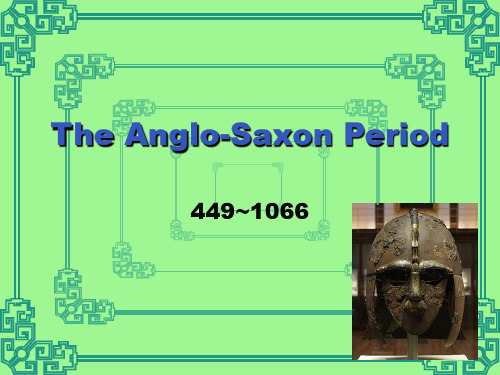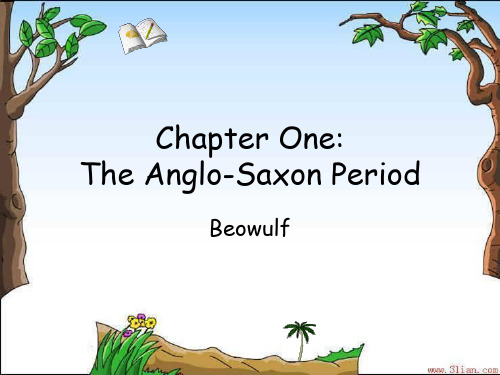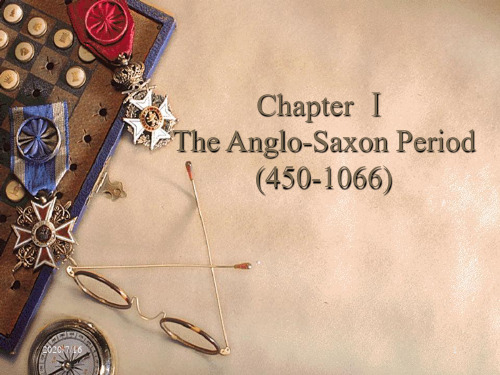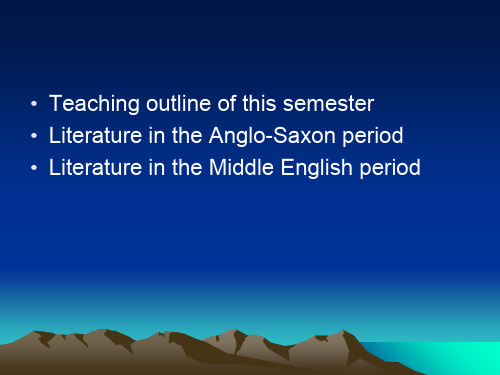英国文学TheAngloSaxonPeriod ppt课件
合集下载
The Anglo-Saxon Period

the Saxons, from Lower Saxony (in modern Germany; German: Niedersachsen) and the Low Countries;
the Jutes, possibly from the Jutland peninsula (in modern Denmark; Danish: Jylland).
Beowulf
Beowulf ( /beiwʊlf/; in Old English [beːow̯ ʊlf] or [beːəwʊlf]) is the conventional title of an Old English heroic epic poem consisting of 3182 alliterative long lines, set in Scandinavia, commonly cited as one of the most important works of Anglo-Saxon literature.
The term Anglo-Saxon is used by some historians to designate the Germanic tribes who invaded and settled the south and east of Britain beginning in the early 5th century and the period from their creation of the English nation up to the Norman conquest. The Anglo-Saxon era denotes the period of English history between about 550 and 1066.[1][2] The term is also used for the language, now known as Old English, that was spoken and written by the Anglo-Saxons and their descendants in England (and part of southeastern Scotland) between at least the mid-5th century and the mid-12th century
the Jutes, possibly from the Jutland peninsula (in modern Denmark; Danish: Jylland).
Beowulf
Beowulf ( /beiwʊlf/; in Old English [beːow̯ ʊlf] or [beːəwʊlf]) is the conventional title of an Old English heroic epic poem consisting of 3182 alliterative long lines, set in Scandinavia, commonly cited as one of the most important works of Anglo-Saxon literature.
The term Anglo-Saxon is used by some historians to designate the Germanic tribes who invaded and settled the south and east of Britain beginning in the early 5th century and the period from their creation of the English nation up to the Norman conquest. The Anglo-Saxon era denotes the period of English history between about 550 and 1066.[1][2] The term is also used for the language, now known as Old English, that was spoken and written by the Anglo-Saxons and their descendants in England (and part of southeastern Scotland) between at least the mid-5th century and the mid-12th century
英语专业英国文学史课件Chapter One Beowulf

•
The crash in the banqueting-hall came to the Danes,
• the men of the guard that remained in the building, • with the taste of death. The deepening rage • of the claimants to Heorot caused it to resound. • It was indeed wonderful that the wine-supper-hall • withstood the wrestling pair, that the world’s palace • fell not the ground. But it was girt firmly, • both inside and out, by iron braces • of skilled manufacture. Many a figured • Gold-worked wine-bench, as we heard it, • started from the floor at the struggles of that pair.
•
• • • •
The men of the Danes had not imagined that any of mankind by what method soever might undo that intricate, antlered hall, sunder it by strength – unless it were swallowed up in the embrace of fire.
Targets of Comments
英国文学上 ppt课件

A Sir Gawain and the Green Knight B Cadmon's Hymm C The Fates of the Apostles D The Canterbury Tales
PPT课件
9
Renaissance
07商务英语本科1班 陈然 01
PPT课件
10
1.Renaissance in European history, refers to the period between 14th century to 17th century. Renaissance in England mainly ranges from the reign of Henry VIII, Edward, Mary and then to Queen Elizabeth and Jacobean Era.
Works and Writers in Old and Medieval Period
PPT课件
1
1.Anglo-Saxons Period (449-1066) works and writers
Beowulf (old English poetry,alliteration押头韵, pagan poem非宗教诗歌, tribal society部落社会)
Thomas Marlory Le Morte D'Arthur 《亚瑟王之死》 (the Death of King)
William Langland Piers the Plowman 《耕者皮尔斯》 (allegory寓言, symbolism象征主义)
PPT课件
4
Geoffrey Chaucer (the father of English poetry,the father of
英国文学史及作品选读课件Chapter 1The Anglo-Saxon Period (450-1066)

(3) Bede (673?-735)
Anglo-Saxon theologian and historian whose major work, Ecclesiastical History of the English Nation (731), written in Latin, remains an important source of ancient English history. He introduced the method of dating events from the birth of Christ.
(2) King Alfred
Known as “the Great.” (849-899)
King of the West Saxons (871-899), scholar, and lawmaker who repelled the Danes and helped consolidate England into a unified kingdom.
Chapter Ⅰ The Anglo-Saxon Period
(450-1066)
2020/7/16
1
3. Historical background:
(1) The earliest settlers of the British Isles were the Celts;
(2) 43-ca.420 Roman invasion and occupation of Britain
2020/7/16
4
4. King Arthur
The Anglo-Saxon Occupation: The native Britons (Celts) were finally confined to the mountainous region of Wales where the modern form of their language is spoken alongside English to this day. In defeat, the Britons produced a body of stories revolving a legendary ruler called Arthur who had fought heroically against the Anglo-Saxon invaders.
Anglo-Saxon theologian and historian whose major work, Ecclesiastical History of the English Nation (731), written in Latin, remains an important source of ancient English history. He introduced the method of dating events from the birth of Christ.
(2) King Alfred
Known as “the Great.” (849-899)
King of the West Saxons (871-899), scholar, and lawmaker who repelled the Danes and helped consolidate England into a unified kingdom.
Chapter Ⅰ The Anglo-Saxon Period
(450-1066)
2020/7/16
1
3. Historical background:
(1) The earliest settlers of the British Isles were the Celts;
(2) 43-ca.420 Roman invasion and occupation of Britain
2020/7/16
4
4. King Arthur
The Anglo-Saxon Occupation: The native Britons (Celts) were finally confined to the mountainous region of Wales where the modern form of their language is spoken alongside English to this day. In defeat, the Britons produced a body of stories revolving a legendary ruler called Arthur who had fought heroically against the Anglo-Saxon invaders.
英国文学 anglo-saxon period

Alliteration
use of the same consonant or vowel at the beginning of each stressed syllable in a line of verse
Of men was the mildest and most beloved To his kin the kindest, keenest for praise
Part one
Early and Medieval Period Anglo-Saxon (epic) Anglo-Norman (romance) 14th century (Chaucer) 15th century (popular ballads)
•
日耳曼人(Germani或Germans)亦称条顿诸民族 (Teutonic Peoples). 日耳曼人是一些语言、文化和习俗相 近的民族的总称。这些民族从前2千年到约4世纪生活在欧 洲北部和中部,即波罗的海沿岸和斯堪的纳维亚地区。日 耳曼人不称自己为日耳曼人。在他们的漫长历史中他们可 能也没有将自己看作是同一个民族。民族大迁徙后从日耳 曼人中演化出斯堪的纳维亚民族、英格兰人、弗里斯兰人 和德国人,后来这些人又演化出荷兰人、瑞士的德意志人、 加拿大、美国、澳大利亚和南非的许多白人。在奥地利也 有许多日耳曼人后裔。许多这些新的民族今天都是与其它 民族混合而成的。
Historical periods
• • • • • • • Early and medieval period (5th ---15th ) The 16th century The 17th century The 18th century The romantic period The victorian age The 20th century
英国文学的PPT教案literature in the Anglo-Saxon and middle english period

The Middle English Period(10661500)
• Influence of Norman Conquest in 1066 in politics: feudalist system was established in England in religion: Catholic Church had a much stronger power over the country in language: three languages co-existed French, Latin, English
5. The period of Enlightenment(启蒙运动)(18th) Alexander Pope Daniel Defoe: Robinson Crusoe Henry Fielding: The History of Tom Jones Jonathan Swift: Gulliver’s Travels Richard Brinsley Sheridan: The School of Scandal Thomas Gray and Robert Burns
romance
Romance: uses narrative verse or prose to sing knightly adventures or heroic deeds 1. hero: knight 2. plot: set out—test: the meeting with the evil—accomplish one’s mission—return most famous one: King Arthur and his knights of the Round Table Sir Gawain and the Green Knight 高文爵士和绿色骑士
英国文学史及作品选读课件Chapter 1The Anglo-Saxon Period (450-1066)

2020/8/4
6
(2) Caedmon:
The earliest English poet. According to Bede, he was an elderly herdsman who received the power of song in a vision. died c. 680
(2) Anglo-Norman Period (Middle English)--- as a result of Norman conquest of the island.
2020/8/4
3
3. Historical background:
(1) The earliest settlers of the British Isles were the Celts;
King Alfred’s contribution to English literature: 3 aspects.
2020/8/4
8
King Alfred’s Contribution to English Language &British Literature
In the 9th century, the Christian Anglo-Saxons were invaded by the Danes. The Danes occupied the northern part of the island. They were stopped by Alfred, King of the West Saxons from 871 till 899, who for a time united all the kingdoms of southern England. Alfred translated various works from Latin. Practically all of Old English poetry is preserved in copies made in the West Saxon dialect after the reign of Alfred.
英国文学 Anglo-Saxon时期

• Chinese myths v.s. North-Euro myth • Chinese heroes v.s. Anglo-Saxon epic
盘古
Ymir尤弥尔
女娲
Frigga 奥丁的妻子和女儿
炎帝
Beowulf
伏羲
奥丁
轩辕黄帝
亚瑟王
• 家庭生活: curtain,chair,cushion,blanket,towel, closet,etc. 打猎: kennel,falcon,chase,warren,covert, quail,etc. 艺术与科学: art,painting,sculpture,cathedral,ma nsion,etc. 医药: medicine,physician,surgeon,plague ,pain,remedy,etc.
Alliteration
• Is the repetition of the same sound or sounds at the beginning of two or more words that are next to or close to each other.头韵
• End rhyme 尾韵
The origin of myths and legends
• 1. human v.s. nature: • sea, forest, animals • dense swamp fog • harsh winter • • 2. the blending of myth and legend
French
政府: government,authority,sovereign,parl iament,treaty,alliance,mayor,etc. 宗教: clergy,cardinal,parson,vicar,commu nion,faith,etc. 法律: bar,judge,suit,jury,evidence,defend ant,verdict,etc. 陆、海军: army,battle,spy,enemy,captain,arch er,etc.
盘古
Ymir尤弥尔
女娲
Frigga 奥丁的妻子和女儿
炎帝
Beowulf
伏羲
奥丁
轩辕黄帝
亚瑟王
• 家庭生活: curtain,chair,cushion,blanket,towel, closet,etc. 打猎: kennel,falcon,chase,warren,covert, quail,etc. 艺术与科学: art,painting,sculpture,cathedral,ma nsion,etc. 医药: medicine,physician,surgeon,plague ,pain,remedy,etc.
Alliteration
• Is the repetition of the same sound or sounds at the beginning of two or more words that are next to or close to each other.头韵
• End rhyme 尾韵
The origin of myths and legends
• 1. human v.s. nature: • sea, forest, animals • dense swamp fog • harsh winter • • 2. the blending of myth and legend
French
政府: government,authority,sovereign,parl iament,treaty,alliance,mayor,etc. 宗教: clergy,cardinal,parson,vicar,commu nion,faith,etc. 法律: bar,judge,suit,jury,evidence,defend ant,verdict,etc. 陆、海军: army,battle,spy,enemy,captain,arch er,etc.
- 1、下载文档前请自行甄别文档内容的完整性,平台不提供额外的编辑、内容补充、找答案等附加服务。
- 2、"仅部分预览"的文档,不可在线预览部分如存在完整性等问题,可反馈申请退款(可完整预览的文档不适用该条件!)。
- 3、如文档侵犯您的权益,请联系客服反馈,我们会尽快为您处理(人工客服工作时间:9:00-18:30)。
The Anglo-Saxon Period witnessed a Transition from tribal society to feudalism.
British Literature I
5. The Anglo-Saxon religious belief
The Anglo-Saxons were heathen (异教徒) people, believing in old mythology of Northern Europe.
Early Inhabitants
Britons
Britain
a tribe of Celts the land of Britons
primitive people clustering of huts
tribal society
2. The Roman Conquest
British Literature I
British Literature I
History and Selected Readings of British Literature
British Literature I
Outline of British Literature
▪ 1. Anglo-Saxon Period 盎格鲁-撒克逊时期(449-1066) ▪ 2. Anglo-Norman Period (Middle Ages)盎格鲁- 诺曼时期
English language was influenced by the Northern mythology.
▪ 6.The Romanticism浪漫主义时期(1798-1832) ▪ 7.The Critical Realism 批判现实主义时期(19世纪30年代-
1918) ▪ 8.The Modern Period现代主义时期(1918-1945) ▪ 9.Contemporary English Literature 当代文学(1945— 至
(1066—1485) ▪ 3.The Renaissance文艺复兴时期(15世纪后期—17 世纪
初)
▪ 4.The 17th Century (Age of Revolution and Restoration)17世纪文学
▪ 5.The Enlightenment 启蒙时期(17世纪后期—18世纪中 期)
55 B. C. Julius Caesar, the Roman conqueror
Britons
fought fiercely
Britain was under control completely by the Roman Empire in 78 A. D.
British Literature I
beginning of 5th century: declining of the Roman Empire
In 410 A. D. Romans withdrew.
400 years of occupation
3. The English/Anglo-Saxon Conquest
British Literature I
families united by kinship(血族关系)
kiቤተ መጻሕፍቲ ባይዱgship (君王统治)
chiefs and warriors the military commander
chief’s bread; the booty (plunder战利品)
power of life and death; close relationship
今)
British Literature I
The Anglo-Saxon Period (449 A.D.-1066 A.D.)
Contents
British Literature I
I.
The Historical Background
II. Characteristics of Anglo- Saxon Literature
After the Roman Conquest, swarms of pirates came to invade from Northern Europe .
盎格 鲁人
Angles
撒克 逊人
Saxons
7 small kingdoms
朱特人 Jutes
7th. C United
into One Kingdom
England: Angle-land
people: English
Language: Anglo-Saxon ︾ Old English
British Literature I
4. Social Condition of the Anglo-Saxons
before the settlement after the settlement the tribal society organs of state
Buildings of Roman style for Roman conquerors
Towns built E.g. London
Highways or Roman roads for military purposes
Christianity introduced
British Literature I
Influences of the Roman Conquest
1.Britons, trodden (trampled) down as slaves or cultivators of the land
2. The Roman mode of life came across to Britain with the Conquest
III.
Anglo-Saxon Poetry
IV.
Anglo-Saxon Prose
V.
Assignments
I. Historical Background
British Literature I
1. The Britons
British Literature I
The English people are not of one origin but a mixed blood.
